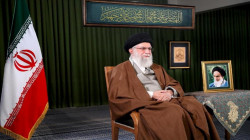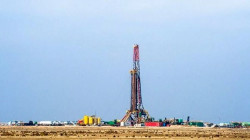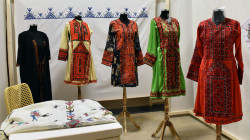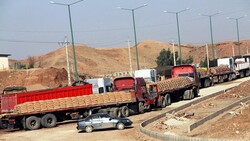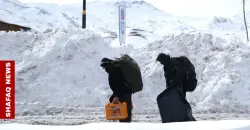Kurds in Iraq fear further cross-border Iranian attacks but rule out invasion
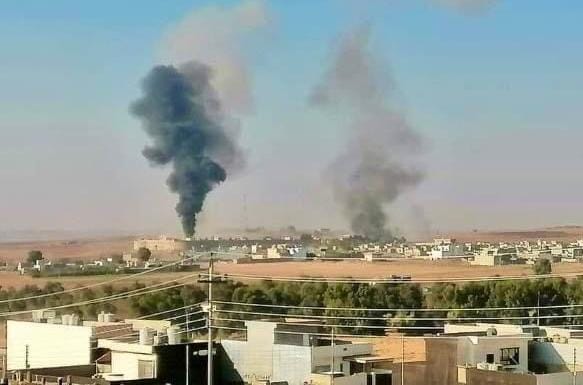
Shafaq News/ The Democratic Party of Iranian Kurdistan’s (PDKI) bases have been emptied.
In the Iraqi Kurdish city of Koya, about a two-and-a-half-hour drive from the Iranian border, locals and Iranian Kurdish refugees fear Iran’s recent drone and missile attacks have not ended.
“The threats persist, the attacks are ongoing,” PDKI Peshmerga commander Karo Rasoli told Middle East Eye, speaking near the emptied castle in Koya that serves as a base for the PDKI.
Iranian forces, Rasoli said, “have accumulated on the border, ground forces as well as missile units - especially outside the cities of Sardasht, Baneh, Piranshahr, and in the Hawraman area”.
The base, also known as “the Castle”, is still scarred by burn marks and craters caused by an Iranian missile attack on 28 September. Destroyed furniture lies scattered about.
Not far from the mountain fort, which has served as a Kurdish headquarters since 1993 and the days of Saddam Hussein, there is a cemetery, the final resting place for dozens of victims of Iran’s attacks.
“This is a camp and the shelters that it has - right here, a 65-year-old woman was killed… these were civilian areas that were bombarded by the IRGC [Iranian Revolutionary Guard Corps],” Rasoli said.
Since the death in custody of 22-year-old Iranian Kurdish woman Mahsa Amini on 16 September, Iran has carried out four cross-border drone and missile attacks into Iraqi Kurdistan. Tehran blames the ongoing protests in Iran on outside forces, particularly exiled Kurdish groups, which it is targeting.
At least 14 people were killed and 58 injured in the 28 September attack that struck the Castle, with Iran attacking a number of Kurdish opposition parties in the Kurdistan region at the same time.
An attack on 14 November saw three killed and 10 injured. Strikes on 20 November killed one and injured 10. And on 22 November, Iranian drones targeted Kurdistan Freedom Party (PAK) bases along the Erbil-Kirkuk border, with no casualties recorded.
Trouble at home
On Tuesday evening across cities inside Iran there were some celebrations following Iran’s World Cup loss to the US, which saw the team knocked out of the tournament.
The question of whether to support the team has dredged up strong, often mixed feelings among Iranians, and the players have at points been accused of not showing enough solidarity with the protesters and of meeting Iranian President Ebrahim Raisi.
On social media, activists posted videos showing Kurdish students celebrating the US victory by dancing in school yards.
Trouble at home is provoking aggression abroad, and journalists are restricted from visiting the area around Koya because of fears that Iran could renew its attacks - despite talks between the Iraqi government and Iran over border security.
“The IRGC has fired different types of missiles at Koya, including Fath 360, Fateh 110 and Shahed 136 missiles. We have information that [the IRGC] has stationed Zolfaghar missiles in Kermanshah region,” Rasoli said.
“We have submitted samples of Iranian drone and missiles to those who have visited the targeted areas, including the [US-led] coalition, the Germans… so far, there has not been solid feedback, but we hope that this will lead to a formal and more serious cooperation,” he said.
The Koya area is about 200km from the Iranian border. Iran has bombarded border areas and threatened to carry out a cross-border ground offensive if Iranian Kurdish opposition groups are not removed by the Kurdistan Regional Government (KRG) or Baghdad.
Iraqi Prime Minister Mohammed Shia al-Sudani has condemned the attacks on Kurds inside his country as a “violation of Iraqi sovereignty”.
Just a month into the job, and dependent to some extent on support from parties and armed factions close to Tehran, Sudani arrived in the Iranian capital on Tuesday, looking to underline that Baghdad would not allow its territory to be used as a “threat” to its neighbour.
Iraqi Kurds have agreed with Baghdad to redeploy 3,000 border force officers to the Iraqi-Iranian border, the Kurdish channel Kurdistan 24 reported. Iran, which says Kurdish fighters and arms are crossing the border into Iran, responded favourably to the decision.
“The only solution is for the Iraqi central government to extend its authority to those areas [where Iranian Kurdish opposition groups operate in the Kurdistan Region] as well,” Iranian Supreme Leader Ayatollah Ali Khamenei told Iraq’s new prime minister on Tuesday, according to Iran’s semi-official Tasnim News Agency.
Tasnim also reported that the IRGC’s ground forces had deployed armoured and special units along Iran’s western and northwestern borders in order to “prevent the infiltration” by “separatist groups”.
Claims of arms smuggling
This deployment has been accompanied by some strident rhetoric. Iran’s foreign minister, Hossein Amirabdollahian, claimed that “our friends in Iraq made a commitment to sweep those terrorist groups away [from Iran’s border] and disarm them in a definite span of time”.
He confirmed that Iran’s military strikes will continue as long as a “threat is posed against Iran from the neighbouring states”. Iranian Kurdish opposition parties have denied posing any military threat to Iran from inside Iraqi Kurdistan.
The Iranian foreign minister has also accused the US and Israel of smuggling weapons into Iran. Iranian state media jumped on comments reportedly made by former US adviser John Bolton - well known for his hawkish stance on the Islamic Republic - who said that Iranian Kurdish opposition groups are armed with weapons “smuggled from Iraq's Kurdistan region”.
The KRG has denied the allegations, saying that it would “never jeopardise the security of its neighbours”, while Iranian Kurds have denied being militarily involved in the protests.
“Our armed party members have not intervened in Iran’s Kurdistan. We have had no operations in or outside Iran in the aftermath of the recent protests.
"The Islamic Republic blames Iran’s Kurdish parties for the protests, which again, is not correct,” Rasoli, the Kurdish Peshmerga commander, told MEE.
Khalid Azizi, spokesperson for the PDKI, denied that Iranian Kurdish parties are separatist, and underlined that the PDKI is for a democratic and political solution in Iran.
He told MEE he didn’t think the KRG or Baghdad government would force the removal of Iranian Kurdish parties. “I don't expect such a solution from Baghdad or the KRG, because we have always been flexible in terms of finding a solution to this crisis,” he said.
“We have always emphasised the reality that the purpose of Iranian missile and drone attacks on us is to divert attention from inside Iran,” Azizi said.
The spokesperson added that his party has no plan or project to send Kurdish peshmerga fighters into Iran. “Our policy is to avoid violence. Iran would like to involve our peshmerga soldiers into this uprising,” he said.
“But our policy is not to do that. We do almost everything possible to not give a pretext to Iran to turn this peaceful civilian uprising into a military confrontation.”
One of the “terrorist targets” hit by Iran was a primary school in Koya, which was heavily damaged and emptied by the 28 September attacks.
“At least two children were injured and one pregnant woman was killed, according to initial reports,” Sheema SenGupta, Unicef representative in Iraq, said in a statement at the time.
“One of the areas targeted by the IRGC missiles was a school that hosts nearly 250 students - the school’s name is Rojhelat [Iranian Kurdistan] Primary School,” said Rasoli.
“In the past month, the students from this school have been relocated to a makeshift school in Koya town to continue their studies, but their psychological situation has deteriorated,” he said.
Rasoli told MEE that Iran’s actions are dependent on the reactions from Baghdad and Erbil.
“If the Islamic Republic does not meet any opposition [from Iraq and the KRG], they could start a ground invasion, and such an invasion could be irreversible,” he said.
PDKI spokesperson Azizi doubts that, in the midst of hard winter conditions, Iran would cross the border for a ground offensive.
“It would not be very easy for Iran in terms of logistics and transferring its arms, and it would create a lot of problems for Iran in Baghdad,” he said.
But he added that in the future, Iran will continue to attack Kurdish opposition groups in the Kurdistan Region by “drones and sometimes missiles”.
Azizi hopes that Baghdad and Erbil will find a solution according to Iraqi sovereignty, and the principles of democracy and human rights. “But I am afraid the Iranian Islamic regime and IRGC will not respect any agreement or any possible solution.”
Source: MIDDLE EAST EYE
